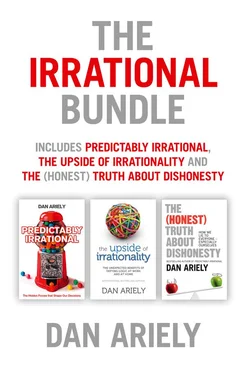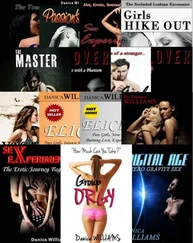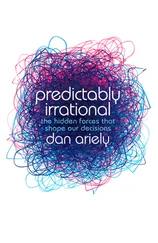Dan Ariely - The Irrational Bundle
Здесь есть возможность читать онлайн «Dan Ariely - The Irrational Bundle» — ознакомительный отрывок электронной книги совершенно бесплатно, а после прочтения отрывка купить полную версию. В некоторых случаях можно слушать аудио, скачать через торрент в формате fb2 и присутствует краткое содержание. Жанр: unrecognised, на английском языке. Описание произведения, (предисловие) а так же отзывы посетителей доступны на портале библиотеки ЛибКат.
- Название:The Irrational Bundle
- Автор:
- Жанр:
- Год:неизвестен
- ISBN:нет данных
- Рейтинг книги:3 / 5. Голосов: 1
-
Избранное:Добавить в избранное
- Отзывы:
-
Ваша оценка:
- 60
- 1
- 2
- 3
- 4
- 5
The Irrational Bundle: краткое содержание, описание и аннотация
Предлагаем к чтению аннотацию, описание, краткое содержание или предисловие (зависит от того, что написал сам автор книги «The Irrational Bundle»). Если вы не нашли необходимую информацию о книге — напишите в комментариях, мы постараемся отыскать её.
The Irrational Bundle — читать онлайн ознакомительный отрывок
Ниже представлен текст книги, разбитый по страницам. Система сохранения места последней прочитанной страницы, позволяет с удобством читать онлайн бесплатно книгу «The Irrational Bundle», без необходимости каждый раз заново искать на чём Вы остановились. Поставьте закладку, и сможете в любой момент перейти на страницу, на которой закончили чтение.
Интервал:
Закладка:
If companies want to benefit from the advantages of social norms, they need to do a better job of cultivating those norms. Medical benefits, and in particular comprehensive medical coverage, are among the best ways a company can express its side of the social exchange. But what are many companies doing? They are demanding high deductibles in their insurance plans, and at the same time are reducing the scope of benefits. Simply put, they are undermining the social contract between the company and the employees and replacing it with market norms. As companies tilt the board, and employees slide from social norms to the realm of market norms, can we blame them for jumping ship when a better offer appears? It’s really no surprise that “corporate loyalty,” in terms of the loyalty of employees to their companies, has become an oxymoron.
Organizations can also think consciously about how people react to social and market norms. Should you give an employee a gift worth $1,000 or pay him or her an extra $1,000 in cash? Which is better? If you ask the employees, the majority will most likely prefer cash over the gift. But the gift has its value, though this is sometimes ill understood—it can provide a boost to the social relationship between the employer and the employee, and by doing so provide long-term benefits to everyone. Think of it this way: who do you suppose is likely to work harder, show more loyalty, and truly love his work more—someone who is getting $1,000 in cash or someone who is getting a personal gift?
Of course, a gift is a symbolic gesture. And to be sure, no one is going to work for gifts rather than a salary. For that matter, no one is going to work for nothing. But if you look at companies like Google, which offers a wide variety of benefits for employees (including free gourmet lunches), you can see how much goodwill is created by emphasizing the social side of the company-worker relationship. It’s remarkable how much work companies (particularly start-ups) can get out of people when social norms (such as the excitement of building something together) are stronger than market norms (such as salaries stepping up with each promotion).
If corporations started thinking in terms of social norms, they would realize that these norms build loyalty and—more important—make people want to extend themselves to the degree that corporations need today: to be flexible, concerned, and willing to pitch in. That’s what a social relationship delivers.
THIS QUESTION OF social norms in the workplace is one we should be thinking about frequently. America’s productivity depends increasingly on the talent and efforts of its workers. Could it be that we are driving business from the realm of social norms into market norms? Are workers thinking in terms of money, rather than the social values of loyalty and trust? What will that do to American productivity in the long run, in terms of creativity and commitment? And what of the “social contract” between government and the citizen? Is that at risk as well?
At some level we all know the answers. We understand, for instance, that a salary alone will not motivate people to risk their lives. Police officers, firefighters, soldiers—they don’t die for their weekly pay. It’s the social norms—pride in their profession and a sense of duty—that will motivate them to give up their lives and health. A friend of mine in Miami once accompanied a U.S. customs agent on a patrol of the offshore waters. The agent carried an assault rifle and could certainly have pounded several holes into a fleeing drug boat. But had he ever done so? No way, he replied. He wasn’t about to get himself killed for the government salary he received. In fact, he confided, his group had an unspoken agreement with the drug couriers: the feds wouldn’t fire if the drug dealers didn’t fire. Perhaps that’s why we rarely (if ever) hear about gun battles on the edges of America’s “war on drugs.”
How could we change this situation? First, we could make the federal salary so good that the customs agent would be willing to risk his life for it. But how much money is that? Compensation equal to what the typical drug trafficker gets for racing a boat from the Bahamas to Miami? Alternatively, we could elevate the social norm, making the officer feel that his mission is worth more than his base pay—that we honor him (as we honor our police and firefighters) for a job which not only stabilizes the structure of society but also saves our kids from all kinds of dangers. That would take some inspirational leadership, of course, but it could be done.
Let me describe how that same thought applies to the world of education. I recently joined a federal committee on incentives and accountability in public education. This is one aspect of social and market norms that I would like to explore in the years to come. Our task is to reexamine the “No Child Left Behind” policy, and to help find ways to motivate students, teachers, administrators, and parents.
My feeling so far is that standardized testing and performance-based salaries are likely to push education from social norms to market norms. The United States already spends more money per student than any other Western society. Would it be wise to add more money? The same consideration applies to testing: we are already testing very frequently, and more testing is unlikely to improve the quality of education.
I suspect that one answer lies in the realm of social norms. As we learned in our experiments, cash will take you only so far—social norms are the forces that can make a difference in the long run. Instead of focusing the attention of the teachers, parents, and kids on test scores, salaries, and competition, it might be better to instill in all of us a sense of purpose, mission, and pride in education. To do this we certainly can’t take the path of market norms. The Beatles proclaimed some time ago that you “Can’t Buy Me Love” and this also applies to the love of learning—you can’t buy it; and if you try, you might chase it away.
So how can we improve the educational system? We should probably first rethink school curricula, and link them in more obvious ways to social goals (elimination of poverty and crime, elevation of human rights, etc.), technological goals (boosting energy conservation, space exploration, nanotechnology, etc.), and medical goals (cures for cancer, diabetes, obesity, etc.) that we care about as a society. This way the students, teachers, and parents might see the larger point in education and become more enthusiastic and motivated about it. We should also work hard on making education a goal in itself, and stop confusing the number of hours students spend in school with the quality of the education they get. Kids can get excited about many things (baseball, for example), and it is our challenge as a society to make them want to know as much about Nobel laureates as they now know about baseball players. I am not suggesting that igniting a social passion for education is simple; but if we succeed in doing so, the value could be immense.
MONEY, AS IT turns out, is very often the most expensive way to motivate people. Social norms are not only cheaper, but often more effective as well.
So what good is money? In ancient times, money made trading easier: you didn’t have to sling a goose over your back when you went to market, or decide what section of the goose was equivalent to a head of lettuce. In modern times money has even more benefits, as it allows us to specialize, borrow, and save.
But money has also taken on a life of its own. As we have seen, it can remove the best in human interactions. So do we need money? Of course we do. But could there be some aspects of our life that would be, in some ways, better without it?
That’s a radical idea, and not an easy one to imagine. But a few years ago I had a taste of it. At that time, I got a phone call from John Perry Barlow, a former lyricist for the Grateful Dead, inviting me to an event that proved to be both an important personal experience and an interesting exercise in creating a moneyless society. Barlow told me that I had to come to Burning Man with him, and that if I did, I would feel as if I had come home. Burning Man is an annual week-long event of self-expression and self-reliance held in Black Rock Desert, Nevada, regularly attended by more than 40,000 people. Burning Man started in 1986 on Baker Beach in San Francisco, when a small crowd designed, built, and eventually set fire to an eight-foot wooden statue of a man and a smaller wooden dog. Since then the size of the man being burned and the number of people who attend the festivities has grown considerably, and the event is now one of the largest art festivals, and an ongoing experiment in temporary community.
Читать дальшеИнтервал:
Закладка:
Похожие книги на «The Irrational Bundle»
Представляем Вашему вниманию похожие книги на «The Irrational Bundle» списком для выбора. Мы отобрали схожую по названию и смыслу литературу в надежде предоставить читателям больше вариантов отыскать новые, интересные, ещё непрочитанные произведения.
Обсуждение, отзывы о книге «The Irrational Bundle» и просто собственные мнения читателей. Оставьте ваши комментарии, напишите, что Вы думаете о произведении, его смысле или главных героях. Укажите что конкретно понравилось, а что нет, и почему Вы так считаете.












